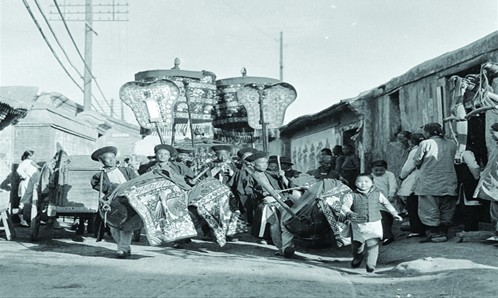 |
| An archival photo of a wedding ceremony. Photo: Courtesy of Zhang Wei |
More help, less demolition
However, according to Zhang, money is not the biggest problem. What his group needs most is understanding and recognition by the local government.
Zhang said he moved the server of their website to Hong Kong in June 2012 because the website was shut down in May "for no reason." He believed that happened because of the arguments made on the website against demolishing old Beijing hutong.
Zhang said there was one Japanese businessman who wanted to buy the website, and there were many foreign institutions wanting to help by giving subsidies. But he said he refused them all. He said he would be very scrupulous when dealing with foreign-related affairs.
The phrase used most frequently by Zhang is "having no choice." "It is very ironic that foreign relic protection institutions are so willing to help us protecting our own culture, while we are in our hardest days in Beijing," said Zhang. "I had no choice but moving the server to Hong Kong, and maybe some day I will have no choice but sell the website to some certain foreign institutions."
Zhang said he was reluctant to sell the archive overseas because he wants China to control its own history.
There is another major difficulty threatening the existence of the website. The hutong and culture within them are quickly vanishing. In the quick process of urbanization, many hutong have been demolished, and a lot of existing ones are now in danger of disappearing as well.
According to Zhang, in 1948, there were 3,068 hutong in Beijing; the number dropped to 1,200 in 2000, 758 in 2005, and less than 500 in 2013.
"We cannot change the trend of urbanization in Beijing," said Zhang. "We just need more time to record and save the photos and videos as historical proof of the existence of old Beijing. Also we need to record the current state of the people living in hutong, and the people who used to live there."
